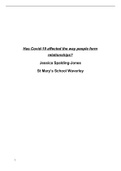Has Covid-19 affected the way people form
relationships?
Jessica Spalding-Jones
St Mary’s School Waverley
1
, Table of content
Introduction ……….…………….page 2
Literature review ……….………page 4
Methodology ……….….………page 20
Discussion of findings.………… page 32
Limitations..................................page 41
Reference list…………………… page 42
Appendix………………………… page 44
Reflection………………………… page 45
2
, Introduction
Has Covid-19 affected the way people form relationships?
The Covid-19 pandemic has impacted life worldwide. Some countries implemented
lockdowns that included banning public gatherings, closing shops, bars, and
restaurants, encouraging people to stay and work from home where possible and
avoiding going out in public unless necessary. People were encouraged to avoid
close physical contact with others and many people chose to play it safe and avoid
social interaction. Even though some remnants of a pre-pandemic world are making
a return and bringing with them vague feelings of ‘normality’, the after effect of the
virus, both mentally and physically are widespread.
The pandemic of an airborne infection assailed human relationships by altering the
ways in which humans interact with one another and their surrounding environment.
Globally, governments attempted to slow the spread of the virus by promoting "social
distancing" protocols, including staying at least 1.5 meters away from anyone outside
one's household. In the execution of social distancing, the term "physical distancing”
better captured the essence of the protocols, that people should remain physically
but not socially distant from others. Physical separation may reduce the spread of
the virus, however, the practice of physical distancing limits people's real-life social
interactions, which limits their sense and understanding of social connection.
Centuries of philosophical studies have focused on the significance of social
relationships and have proven that social connection is crucial for the welfare of
humanity. The extent of the impact of a disrupted physical accessibility in people’s
social connections is thus a real area of concern.
COVID-19 demanded an adaptation to a “new normal” and imposed a myriad of
fundamental changes in the way people form relationships not only with one another
but with themselves. It resulted in changes such as the way people either embraced
or moved away from their families and surroundings, approached their mental states,
the rise and fall of political movements and fluctuating concern and knowledge about
health and the health care systems. This research task will examine how Covid-19
has affected the formations of all kinds of relationships to a greater and lesser
extent.
3
, Literature reviews
Source 1
Luscombe, B., 2021. What We Learned About Relationships During COVID-19.
[online] Time. Available at: <https://time.com/6076596/relationship-lessons-during-
covid-19/> [Accessed 7 March 2022].
Summary of source
This source is an article that looks at the idea that for a relationship to last, it needs
time, togetherness, and affection to create a strong bond. The article poses the
questions of what happens to relationships and their interconnectedness when time,
affection, and togetherness are removed or increased? The article analyses a series
of studies published in the "Journal of Social and Personal Relationships, "which
dedicate several issues to relationships during Covid. The researchers looked at how
gender roles, in New Zealand, in the home, got more defined and how there was a
backward shift towards traditional gender roles that were not there before Covid 1.
However, the article explains how single people are desperate and more interested
in being in a relationship than they are concerned about the pandemic, as their need
for affection is dire, and the thought of a pandemic is not as "serious." Thus, proving
that people are in desperate need of physical connections. The article further
illustrates that couples, mostly homosexual couples, who refrained from complaining
about their relationships when something was wrong had a less satisfying
relationship. They suffered more anxiety and depression and leaned more heavily on
substance use during the pandemic. This means those relationships grew apart and
started to deteriorate because they were not voicing their opinions. The study also
found that many people had difficulty adjusting to social media as a form of
communication and violated social distancing protocols to see one another. The
need for connection overrides the protocols 2. "A problem many couples can face
1
Luscombe, B., 2021. What We Learned About Relationships During COVID-19. [online] Time. Available at:
<https://time.com/6076596/relationship-lessons-during-covid-19/> [Accessed 7 March 2022].
2
Luscombe, B., 2021. What We Learned About Relationships During COVID-19. [online] Time. Available at:
<https://time.com/6076596/relationship-lessons-during-covid-19/> [Accessed 7 March 2022].
4




